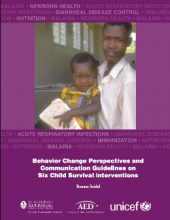Behavior Change Perspectives and Communication Guidelines on Six Child Survival Interventions
This document is meant for those who want to incorporate behavior change and communication strategies into their child survival programs, as well as those who already plan and carry out such activities. It focuses on six major interventions and the key practices associated with these. It examines the challenges associated with improving these practices in developing country contexts, and aims to provide insight into how to design effective strategies. Behavior Change Perspectives and Communication Guidelines Year of Publication: 2005 Organization: Johns Hopkins Center for Communication Programs, Academy for Educational Development, UNICEF Length: 294 pages Languages: English

